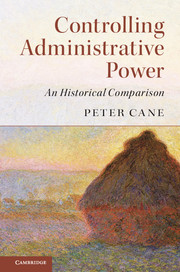Book contents
- Frontmatter
- Dedication
- Contents
- Preface
- Table of cases
- Table of legislation
- 1 Introduction: concepts and methodology
- 2 The English system of government
- 3 The US system of government
- 4 The Australian system of government
- 5 The development and institutional structure of control regimes
- 6 Administrative interpretation
- 7 Administrative fact-finding and policy-making
- 8 Administrative rule-making
- 9 Administrative adjudication
- 10 Private law controls
- 11 Controlling information
- 12 The New PublicManagement
- 13 Controlling the controllers
- 14 Concluding reflections on methodology and themes
- Bibliography
- Index
14 - Concluding reflections on methodology and themes
Published online by Cambridge University Press: 05 March 2016
- Frontmatter
- Dedication
- Contents
- Preface
- Table of cases
- Table of legislation
- 1 Introduction: concepts and methodology
- 2 The English system of government
- 3 The US system of government
- 4 The Australian system of government
- 5 The development and institutional structure of control regimes
- 6 Administrative interpretation
- 7 Administrative fact-finding and policy-making
- 8 Administrative rule-making
- 9 Administrative adjudication
- 10 Private law controls
- 11 Controlling information
- 12 The New PublicManagement
- 13 Controlling the controllers
- 14 Concluding reflections on methodology and themes
- Bibliography
- Index
Summary
Methodology again
As I said in Chapter 1, to the extent that I began this project consciously (if somewhat unreflectively) following a particular methodology, it was a ‘legal-formalist’ variety of ‘historical institutionalism’. In the course of the project, I have gained a better understanding of some of the methodological commitments that my approach involves, and it may be useful to say something more about them. The first point concerns what I described in Chapter 1 as the ‘symbiotic’ relationship between governmental structures and their social, political, economic, cultural and intellectual environments. Although the potential of structural explanations of control regimes has been highlighted in this book, the explanatory analysis has, at various points and to various degrees, referred to the various environments of governmental structures.
This approach is informed by theories of ‘cultural evolution’ that explain cultural phenomena, such as legal institutions and norms, in terms of a complex set of interactions between genetically based, ‘species-universal’, human psychological and physical behaviours, and the (contingent) environments (both natural and human-made) in which human beings are located in various places and at various times. I consider the capacity for normative thought and norm-guided action to be part of humanity's species-universal, genetic inheritance that most, if not all, other living species lack. Normative behaviour and culture generally, and legal behaviour and legal culture in particular, are products of the exercise of this capacity, the shape and content of which are influenced by, and in turn influence, the various external environments within which human beings are located. Legal rules and principles, and legal systems, are ‘real’ social phenomena generated by human behaviours, phenomena that can be and are affected by, and can and do affect, the extra-legal environment and which, therefore, can be fully understood only in relation to that environment.
The general idea that that cultural practices (like the living world generally) are best understood, not in isolation but in relation to their environments, has played out in this book in three main ways. It is manifested, first, in the conceptualisation of control regimes as sub-systems of legal systems, the latter constituting a legal environment in which such regimes operate and with which they interact; secondly, in the contrast between norms on the one hand, and institutions and practices on the other, both of which are central to the definitions in this book of ‘systems of government’ and ‘control regimes’, respectively.
- Type
- Chapter
- Information
- Controlling Administrative PowerAn Historical Comparison, pp. 507 - 520Publisher: Cambridge University PressPrint publication year: 2016



